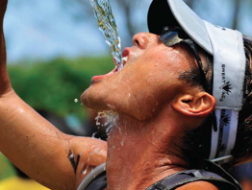Hydration tips for endurance athletes & longer workouts/races/runs

I have a couple nutrition clients who are endurance athletes/triathletes/runners etc and we have worked together to get their nutrition and hydration on point. So I thought I would put together a post with some of my experiences with them and share some simple tips on hydrating for longer runs/workouts.
-Be sure to have a sport drink with you for all workouts lasting more than 1 hour; this should contain a mixture of electrolytes, carbohydrates and fluids in an appropriate concentration to digest well and to be efficiently absorbed.
-For very intense workouts lasting less than an hour, as a minimum have an electrolyte tablet in a bottle of water.
-For triathlons/ironmans etc., aim for around 700ml of fluid on the bike per hour and at least 500ml of water per hour while running. Try to get around 200ml of fluid every 20min while running. Small sips more frequently will help with digestion and hydration.
-Cool your body during all workouts in the heat (ex. bike/run). Be sure to bring liquid calories for every hour of training but additional water can be consumed as well as used for cooling the body.
-Don't wait for thirst to kick in during endurance workouts/racing. You need a fueling regime to meet needs and a schedule, & then just follow the routine, rather than waiting until you feel like you need water or hydration. Your body is very smart and it works really hard to correct itself during all scenarios. So any cues that you receive or changes in performance, this is simply your body’s way of trying to fix itself. For some, the body may eventually start shutting itself down so that you do not risk very serious injury to your body. This isn't because you didn't train hard enough or because you are weak but rather because you did not pace and fuel smart.
-Although you don't need to overhydrate (especially on water), start your fueling strategy early in training/racing (for example start drinking your sports drink within 10 min of working out/racing) and sip it frequently. An athlete who waits to drink until he/she is thirsty is behind on fluid requirements and many times, this will cause an athlete to drink an excessive amount of water (as it may be more palatable as a race/training continues) and may cause hyponatremia (very serious) or may cause bloating by trying to drink too much at once (often a hypertonic amount from guzzling a lot of drinks too close together).
-Make your nutrition during workouts as simple as possible. You should not be using 3 different methods of getting electrolytes, calories/carbohydrates/sugars and fluids. This will just make it difficult to ensure that you are meeting your needs. Keep it straightforward and as convenient as possible.
-Pace yourself. Mild dehydration affects performance and can cause drowsiness, irritability, loss of concentration and headaches. When dehydration becomes worse, serious performance inhibitions occur which also affect the heart, brain, muscles and organs. Successful athletes know how to pace an effort so that nutrition/hydration is helping fuel the effort. If you overwork your body it is not possible to overfuel the body to meet your training/racing demands.
-Lastly, be respectful of your body if the plan doesn't go as planned. If you are feeling any changes with your body that do not feel normal, first slow down. If you are not able to get yourself to that "feel good" place that you have felt in past workouts, you should not continue to push your body or it will eventually be unable to meet any physiological demands that you are trying to place on it. Never get upset at your body for a bad workout or race. Remember your body is simply trying to do what it knows to do and that is protect you from a serious heat stroke, dehydration or other-related injury.
Join the other 10,000+ who get my best fitness, diet & mindset tips.



Comments